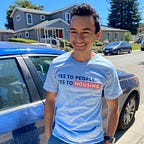How We Choose to Serve
A Martin Luther King Jr Day Reflection by Alex Melendrez
Martin Luther King Jr. Day is sometimes known as a “Day of Service”. “A day on, not a day off” is the phrase. Dr. King’s legacy was deeply rooted in service and addressing pressing community needs. In 1966, Reverend Martin Luther King Jr co-lead the Chicago Freedom Movement. At the time, Chicago was one of the most heavily segregated cities in the country, with Black renters and homeseekers effectively shut out of the middle class and often forced to live in substandard conditions. The Chicago Freedom Movement sought racial justice, equity, and opportunity. Affordable and fair housing was a key part of the movement. This was just one of many ways Dr. King chose to serve his community.
It was due to his (and other Civil Rights leaders’) service and sacrifice that the The Civil Rights bill of 1968, otherwise known as the Fair Housing Act, was passed, after Dr. King’s assassination. While the Fair Housing Act was a critical step to combating various forms of discrimination in housing, the work is not finished.
After meeting with one Fair Housing attorney this week, I learned that there were still major gaps and unfulfilled promises in the law. For example, the Fair Housing Act doesn’t protect against discrimination toward the LGBTQ+ community, nor protect against discrimination based on income while sexual harassment and discrimination against families with children is still common (despite being included as a protection). On top of that, even 53 years later, America is still heavily segregated. This includes our own San Mateo County, and other Bay Area regions. Years of redlining, segregation and displacement have led to the economic and racial inequity for predominantly Black individuals and families.
There remains a massive deficit of justice and opportunity that must be made up for. It must take place in our own communities and our own backyards. While explicit racial exclusion may be illegal, exclusionary zoning policies, which disproportionately affect communities of color, still take place in our cities. They take shape in height and density limits, in a lack of affirmation affordable housing goals, extensive review and more.
Today, we at the Housing Leadership Council of San Mateo County do our best to not just uphold a key part of Dr. King’s legacy but further his dream for a truly integrated America by creating more land, money, and political will for affordable housing. It’s reflected in our organization’s mission to “work with communities and their leaders to create and preserve quality affordable homes.”
This is how we choose to serve our community, beyond just the “Day of Service”. We do this so everyone who works, lives, and grows up in San Mateo County can have a suitable place to call home. We can’t do it alone, nor would Dr. King want us to. The housing and affordability crisis, combined with COVID-19 has created a sense of urgency that can’t be ignored. We hope you will serve with us soon.
Alex Melendrez, Digital Organizer at Housing Leadership Council.
(Article originally published in Housing Leadership Council of San Mateo County’s January 22, 2021 Newsletter)
